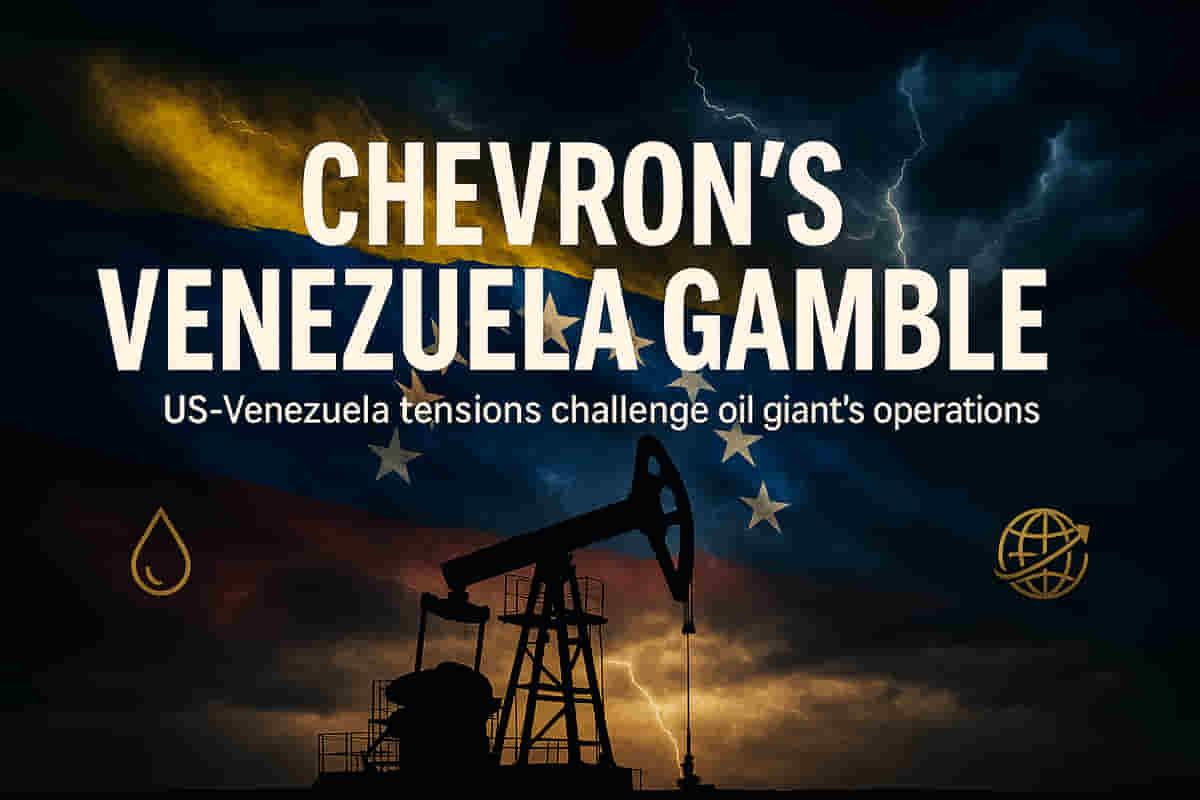Chevron Navigates Geopolitical Tightrope as US Pressure Mounts on Venezuela
Energy
|
Updated on 31 Oct 2025, 10:08 am
Reviewed By
Aditi Singh | Whalesbook News Team
Short Description :

▶
Detailed Coverage :
Chevron has secured a license to resume oil drilling operations in Venezuela, a region rich in oil where it has a long history. However, this return is complicated by the United States' strong stance against Venezuelan President Nicolás Maduro, including significant military presence in the Caribbean.
The company, employing around 3,000 people in Venezuela through joint ventures, acknowledges the safety of its personnel and assets as a top priority amidst heightened geopolitical tensions. Chevron's CEO, Mike Wirth, has actively lobbied U.S. officials, arguing that Chevron's presence is crucial to maintain American influence and prevent China from expanding its foothold in Venezuela's oil sector.
Despite past risks, including the detention of Chevron executives and nationalization of assets by previous Venezuelan regimes, Chevron has persisted. The company's operations in Venezuela, while historically less than 10% of its global production, accounted for 3% of its cash flow last year. The U.S. sanctions on Venezuelan oil require specific exemptions for companies like Chevron to operate.
Recent license terms reportedly prohibit direct cash payments to the Maduro government, differing from previous arrangements, which impacts revenue streams. Venezuela's oil exports to the U.S. have decreased, with a portion potentially rerouted to China. Experts note that Chevron's continued operations, even under U.S. sanctions, can be perceived as undermining the U.S. foreign policy objectives aimed at isolating Maduro.
Impact This situation can influence global oil prices and supply dynamics. Geopolitical instability in major oil-producing regions often leads to market volatility, affecting energy costs worldwide. The U.S. policy towards Venezuela, and Chevron's role within it, has implications for international energy security and U.S. influence in Latin America. Rating: 7/10.
Difficult terms: Authoritarian state: A country governed by a single leader or a small group with absolute power, often without constitutional limitations or popular consent. Crosshairs: A position of being a target; under severe scrutiny or attack. Joint ventures: Business agreements where two or more parties pool their resources for a specific undertaking. Nationalized: When a government takes control of industries, land, or assets that were previously privately owned. Sanctions: Penalties or restrictions imposed by one country on another for political or economic reasons. Tariffs: Taxes imposed on imported goods. Beleaguered economy: An economy facing severe difficulties, struggling with recession, high unemployment, or inflation. Exodus: A mass departure of people.
More from Energy

Energy
India's green power pipeline had become clogged. A mega clean-up is on cards.
Latest News

Auto
Suzuki and Honda aren’t sure India is ready for small EVs. Here’s why.

Brokerage Reports
Stocks to buy: Raja Venkatraman's top picks for 4 November

Mutual Funds
Quantum Mutual Fund stages a comeback with a new CEO and revamped strategies; eyes sustainable growth

Tech
Why Pine Labs’ head believes Ebitda is a better measure of the company’s value

Banking/Finance
SEBI is forcing a nifty bank shake-up: Are PNB and BoB the new ‘must-owns’?

Industrial Goods/Services
India’s Warren Buffett just made 2 rare moves: What he’s buying (and selling)
Startups/VC Sector

Startups/VC
a16z pauses its famed TxO Fund for underserved founders, lays off staff
Renewables Sector

Renewables
Brookfield lines up $12 bn for green energy in Andhra as it eyes $100 bn India expansion by 2030
Startups/VC Sector

a16z pauses its famed TxO Fund for underserved founders, lays off staff
Renewables Sector
